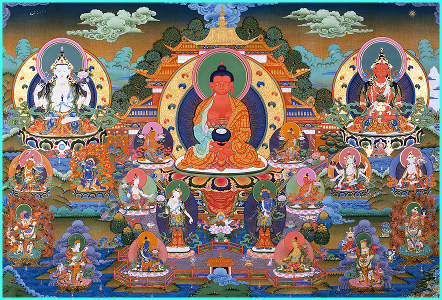Amitabhavyuha Sutra: Difference between revisions
Jump to navigation
Jump to search
No edit summary |
m (→Text) |
||
| Line 6: | Line 6: | ||
*[[Ratnakuta]] section, [[Toh]] 49 | *[[Ratnakuta]] section, [[Toh]] 49 | ||
[https://web.archive.org/web/20140512124959/http://www.bdk.or.jp/pdf/bdk/digitaldl/dBET_ThreePureLandSutras_2003.pdf The Three Pure Land Sutras], includes a translation from Chinese of the Amitabhavyuha Sutra by Hisao Inagaki, 2003 | The text was also translated in Chinese. | ||
*[https://web.archive.org/web/20140512124959/http://www.bdk.or.jp/pdf/bdk/digitaldl/dBET_ThreePureLandSutras_2003.pdf The Three Pure Land Sutras], includes a translation from Chinese of the Amitabhavyuha Sutra by Hisao Inagaki, 2003 | |||
==Internal Links== | ==Internal Links== | ||
Latest revision as of 21:44, 22 November 2023

Amitabhavyuha Sutra (Skt. Amitābhavyūhasūtra; Tib. འོད་དཔག་མེད་ཀྱི་བཀོད་པའི་མདོ།, Wyl. 'od dpag med kyi bkod pa'i mdo), which is also known as the "longer" Sukhavativyuha Sutra (Skt. Sukhāvatīvyūhasūtra), gives a detailed description of the Sukhavati pure realm of Buddha Amitabha. It also details the dozens of vows that Amitabha made, in a previous life as the monk Dharmakara, that give Sukhavati its special qualities and that cause the great benefits of merely hearing Amitabha's name. The teaching takes place on Vulture's Peak Mountain near Rajagriha.
Text
The text was translated into Tibetan from Sanskrit by Shyang Yeshé Dé.
The text was also translated in Chinese.
- The Three Pure Land Sutras, includes a translation from Chinese of the Amitabhavyuha Sutra by Hisao Inagaki, 2003